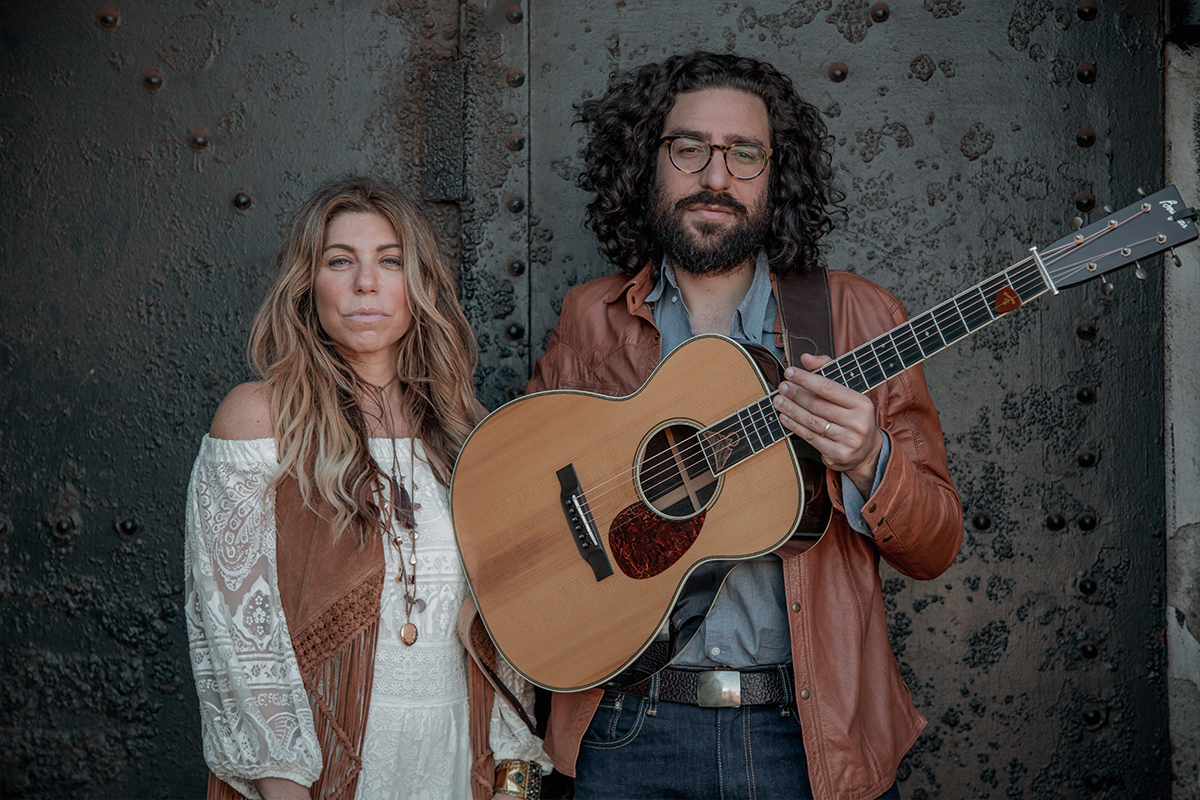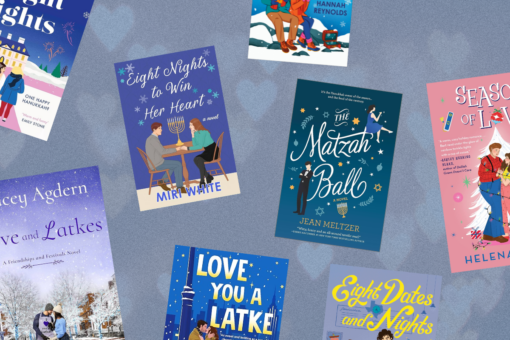You may not often put “Jewish” and “bluegrass” together. But Nefesh Mountain, led by Jewish husband-and-wife team Doni Zasloff and Eric Lindberg, are here to change that. On their third album “Songs for the Sparrows,” out today, they worked with some of the most established and respected musicians from across the world.
Each track seeks to evoke “the sensation of roaming through the unknown.” Their sound, which they describe as “elegantly wayward,” incorporates folk sounds from Appalachia to Ireland to Eastern Europe.
Many of the new album’s songs are explicitly Jewish. “Piece of the Sun” is a nod to Anne Frank’s famous optimism; other tracks respond to the Tree of Life shooting, reinterpret the Hashkiveinu, and explore the story of David and Goliath.
I emailed with Nefesh Mountain about the roots of their name, an inspiring trip to Eastern Europe, and the newest member of the band.
This interview has been lightly condensed and edited for clarity.
What is the meaning behind the band’s name, Nefesh Mountain?
Doni: Nefesh is a beautiful Hebrew word for soul, life, and the inexplicable “animated spirit” in all living things. We love it because it’s a bit ambiguous — like a melody or color, it can mean so many things and be interpreted in so many beautiful ways. We sing music from our souls. We created Nefesh Mountain when we fell in love, so we wanted to use the word Nefesh in our name. And, of course, mountains are universal, and everyone seems to have their own very unique and powerful connection with them. We love how mountains at times are a reminder of what is greater than us, that we’re not the ones necessarily in control — and on the flip side, they also remind us that we can conquer and climb to such high peaks. There are so many important mountains in Jewish history and some of the greatest music from all over the world has come from mountain regions — bluegrass and old-time included — so the name just felt right to us.
How did you come to bluegrass as a form, and how did you come to infuse Judaism into your music?
Eric: Bluegrass music is a form that we have both played and loved for years. It’s hard to say how different types of music come into your life. For some, they’re born into this world of bluegrass festivals, fiddle tunes, jams, etc., but for us as New Yorkers, where it really wasn’t very prevalent until about the last decade or so, it’s something that magically found its way to us at a young age.
When we formed Nefesh Mountain, we didn’t exactly sit down and try to infuse Judaism into Bluegrass musical stylings. Personally, we’re actually not huge fans of “mash-ups” in general because usually those types of things don’t wear that well in the end and they sort of feel kitschy. Our aim, then and now, was just to write songs that were important to us, and, like any recording artist, reflected who we are. When writing, there are times where we are deeply inspired by our history as Jews, who our ancestors were, what they’ve gone through and how we’ve endured as a people through centuries. There are other times where we write songs about our own lives: being husband and wife, parents, traveling, love. And there are also others when we write songs and spirituals inspired by ancient text, teachings, and wisdom from our Jewish heritage. For us, these are all fragments of who we are as Jewish Americans, and every day we are just so grateful to be able to tell our story through music.
Please tell me about the trip that inspired “A Sparrow’s Song.” What did you learn on that trip and where did you visit? What are the musical/folk influences you’re drawing from in it?
Doni: Back in August 2018, my mother brought our family out on a “roots trip” to Poland and Ukraine where we visited many of the towns and cities where our ancestors were from. It was a profound experience. I remember a moment where I was standing in a field, looking at the bounding hills off in the distance, huge billowing clouds overhead and birds flying into the horizon. It was a beautiful day, but I also knew that the ground that I was standing on was a graveyard — my family’s graveyard — and it was gone.
The days on this trip were all like this; sometimes joyous and filled with wonder for this world and our homeland that is so much a part of us, and other times where we felt this heavy, persistent dull pain… one that I realized has always been there, and may never exactly go away.
Fast forward just a couple months: We’re back home stateside, it’s now October 2018, and the Tree of Life shooting takes place. For about a day, Eric and I both went a bit numb. We stayed home with our family and talked about what was going on with our kids, but in truth we really couldn’t process all that much at the time. It was the next morning that Eric woke up and began playing these very somber melodies and broken chords on the banjo, and we both knew what and who this song was for. We wrote “Tree Of Life” that day for the communities in Pittsburgh, with only the hope that it might relieve their pain, if only for a few seconds.
Strangely enough, though, it seemed to take on a life of its own, and before we knew it hundreds of communities were singing “Tree Of Life” for their own memorials, vigils, and services that very next weekend. We’re truly honored that this song has meant so much to so many over the years, and are really proud that it is also the closing song on the album, ending with the lyrics: “Oh sweet spirit hear my prayer / help these words heal someone out there.”
“A Sparrow’s Song” in a way is the title track on “Songs For The Sparrows” and really gets to a lot of these feelings that we’re wresting with these days. Since the trip and Tree of Life, we have seen an even greater rise in antisemitism, hate and injustice, and “A Sparrow’s Song” is certainly a reaction to all of it. The sparrow is a bird that we’ve both been drawn to for so long. They live all over the world on every continent, and seem to always be hanging out in the trees just outside of our own house. In this song and throughout this record they represent the small but mighty voices that have been discriminated against throughout the ages. So these songs on the album are for them — the lives that were lost, the voices silenced — and in many ways for so many of us today, as they are all ultimately about letting love and light be your fuel in darker days.
Tell me a little bit about “Evermore (Hashkiveinu)” and how that song came to be.
Doni: We wrote Evermore in a cabin up in Willow, NY, just outside of Woodstock, and it was one of those writing experiences where the words just seemed to appear on the page. It is of course hugely inspired by Hashkiveinu which for both of us is one our most treasured prayers. The text of Hashkiveinu had always read like poetry for us, and we wanted to write a folk song that embodied the spirit of this beloved prayer.
As the song nears the end we sing the lyrics of Hashkiveinu in Hebrew, which for us is where the song splits and becomes a bit more meditative. We think of this part like a boat slowly rocking in the waters, drifting towards the moon out on the horizon.
How did you come to write the bonus track, “David and Goliath”?
Eric: Bryan Sutton is one of my absolute favorite guitar players, and first I wrote this guitar duet just as an excuse to get to play more with him! For me, Bryan is such an amazing improviser and technician, and I wanted the spirit of this tune to have this “battle” and “duel” aspect to it. When we sat down to rehearse it in the studio though, the song really took on a new life, and we both approached it more as a conversation and dialogue, one where we each had our own things to say while listening to what the other was saying. In a way I think we wanted to turn the idea of the David and Goliath story on its ear — and instead of a classic battle, it became more of a gentle sparring match, one focused on making something whole together, rather than with separate voices.
What is the breakdown of roles between the two of you as you write?
Doni: We don’t think about it too much these days, and every song is a bit of a different journey and writing process. The composed arrangements and much of the written music is something that Eric generally takes on, but overall the lyrics and melodies are an even split. Sometimes I write more, sometimes he does, but we really share the process and enjoy that part. Even some of the instrumentals are talked about between us before Eric goes and writes the themes. For “Suite For A Golden Butterfly,” we both wrote a whole story and narrative first, which eventually became an instrumental 5 movement suite.
Has the pandemic changed your process as musicians? Did it affect this release?
Eric: The pandemic has most certainly changed our process as musicians. The last year has pretty much flat-lined the music and touring industry, and when the lockdown first went into effect we had to cancel about 75 shows. As musicians, though, we have to be able to improvise and bend and flow with the times, so we built a video studio in our home and learned how to really set up a good live stream for Zoom shows. In the last year we’ve played hundreds of shows and appearances on Zoom, Facebook, and other streaming sites which really got us through. While it was certainty rough going at times, we were really grateful for the ability to still perform throughout the year and stay connected to so many communities.
What’s next for you?
Doni: In case you didn’t know already, we’re expecting our little Nefesh Mountain baby girl any day now! We’re both over the moon excited for this addition to our family and just feel so lucky to have all these blessings in our life… to have both a baby and a new album “release” the same week is a dream come true.



